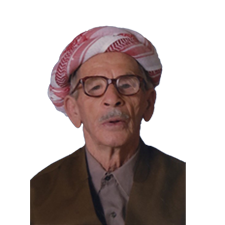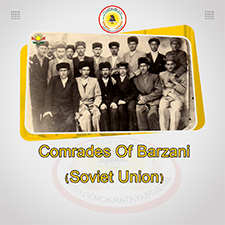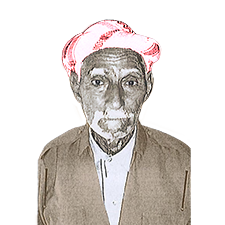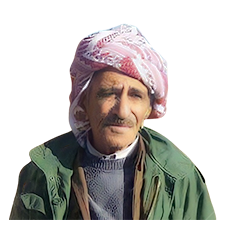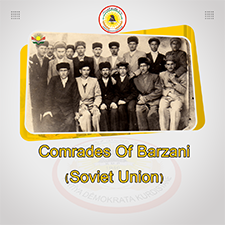Biography:
Piro Chicho Aziz was born in 1922 in the village of Guyze of Erbil. He was married to Sakhiba Skhawadeen in the Soviet Union. They had a daughter by the name of Zlimr Piro who was born in 1955. In 1959, after his return from the Soviet Union, he was an employee in the sugar factory in Musl. With the start of “Aylul” revolution, he moved his house to Guyze village. In 1978, he was transferred to bahirka community by the Ba’th regime; he later on resides in the Bastapyaza neighborhood of Erbil, and he becomes an employee of the agriculture office. In 1991, as a refuge, he travels to the Islamic Republic of Iran and later travels back to southern Kurdistan. In 1996, due to the civil war, they left their home and went to the Bahrka community. Piro was an expert in both Kurdish and Russian. On 15th November 2006, he passed away and was buried in Bahrka.
In 1943, he contacted those that where a part of the second Barzani revolution, and he participated in the battles; he got injured twice. On 19th August 1945, by the order of the military court of Iraq, they confiscated his transferred and non-transferred properties. On 11th October 1945, after the fall of Barzan’s second revolution, he travels to eastern Kurdistan. After the creation of the Republic of Democratic Kurdistan in Mahabad, on 31st March 1946, as a soldier of Barzani military, he protected the republic and participated in the battles of Saqiz.
Following the fall of the Kurdistan Democratic Party (KDP) in Mahabad and the return of Barzani from eastern Kurdistan to southern Kurdistan, Piro participated in the battles of “Naghada” and “Shno” in eastern Kurdistan. Also, he was one of those peshmergas on 19/4/1947 who went through the road of “Khwakurk u Dashti Baraz grawa” on the land of northern Kurdistan to return to “Sherwan” and “Mzuri”.
After their return, General Mustafa Barzani on 15/5/1947 in the village of “Argush” conducted a meeting with his comrades and granted them the freedom in whether to stay or go to the Soviet Union. In the meeting, everyone decides to leave and go to the Soviet Union. On the 23rd of May in 1947, Piro helps and travels with General Mustafa to the Soviet Union and fights in the battles of “Gali Qtur” and the “Mangoor”. After a lot of hardships, on the 18th of June in 1947, Piro was able to travel to the Soviet Union after passing through the Aras River which was between the borders of Iran and the Soviet Union.
After their arrival to the Soviet Union on the 19th of June in 1947 in the city of “Nakhchawan” in the Republic of Azerbaijan, for forty days, all of the comrades were placed in a community that was surrounded by barbed wire. They were being monitored by the soldiers and were treated like hostages of war when it came to food and clothes. Afterwards, the Soviet government decided that the comrades should be divided into the places of “Aghdam”, “Lachin”, “Ayulax” and “Kalbajar” in the Republic of Azerbaijan. On the 10th of December in 1947, they were transported to a military camp on the lake of “Khazar” in the capital of the Republic of Mahabad “Bakor”. On the 23rd of the same month, they were given military clothes and were trained by the officers of the republic 8 hours a day. On top of that, some of the comrades that were literate in Kurdish would teach them for 4 hours a day.
After the ill-treatment of “Jaafar Baqrov” with the comrades, on the 29th of August in 1949, Barzani decides to transport his military camp from the republic of Mahabad to a “Chrchuk” community near the city of “Ashkand” which was the capital of Uzbekistan; there they continued their military practices.
In March 1949, the comrades were divided into the villages of the Soviet Union and farms (where civilians would rent them from the governments and pay them back later). The comrades were working in these places.
Following multiple letters to Stalin by General Barzani, a letter finally reaches Stalin where it talks about the hardships the comrades are going through. Stalin immediately creates a party to investigate the comrades of Barzani; the party comes to the decision that everyone should gather in the city of “Vrivsky”. Piro travels to the city in November of 1951.
After the revolution of the 14th of July in 1958 in Iraq and the return of General Mustafa Barzani on the 25th of February in 1959, Barzani and his comrades were granted full amnesty by the government.
Because of the creation of the Republic of Iraq in 1958 by Abdul Kareem Qasim, Piro along with his comrades travelled back to Kurdistan with the ship “Grozya” through the harbor of “Basra” on the 16th of April in 1959.
Sources:
- حهمید گهردی، پوختهی مێژوونامه، چاپی یهكهم، (ههولێر - دهزگای چاپ و بڵاوكردنهوهی ئاراس - چاپخانهی وهزارهتی پهروهرده - ٢٠٠٤ز).
- حیدر فاروق السامرئي، ضیاء جعفر ودوره السیاسي و الاقتصادي في العراق، (لندن – دارالحكمة - ٢٠١٦م).
- ڕێكاری مزویری، ژنێن رۆس و ڕاگواستن و ئهنفال و كۆمهلكوژی، چاپی یهكهم، (ههولێر – چاپخانهی مناره - ٢٠١٠ز).
- شهعبان عهلی شهعبان، ههندێك زانیاری سیاسی و مێژوویی، چاپی سێیهم، (ههولێر - چاپخانهی رۆژههلات - ٢٠١٣ز).
- شهوكهت شێخ یهزدین، یۆبیلی زێڕینی پێشمهرگه، (پیرمام - چاپخانه خهبات - ١٩٩٦ز).
- عمر فاروقی، سردار دانا زندگی و مبارزات مرحوم ملا مصطفی بارزانی، چاپ دوم، (ههولێر - چاپخانهی وزارت آموزش و پرورش - ٢٠٠٢ز).
- عهبدولڕهحمان مهلا حهبیب ئهبوبهكر، عهشیرهتی بارزان له نێوان ١٩٣١-١٩٩١، چاپی یهكهم، (ههولێر - چاپخانهی وهزارهتی رۆشنبیری - ٢٠٠١ز).
- كاروان محهمهد مهجید، بارزانییهكان له مههابادهوه بۆ سۆڤێت، چاپی یهكهم، (سلێمانی - چاپخانهی پهیوهند - ٢٠١١ز).
- گۆڤاری ههتاو، ژماره ١٥٤، ساڵی شهشهم، ههولێر، چاپخانهی كوردستان، ههینی، ١٥ نیسانی ١٩٥٩.
- له یادداشتی فهرماندهی شههید حهسۆ میرخان ژاژۆكی، ٦٢ رۆژ لهگهڵ بارزانی دا چوونی بارزانییهكان بۆ یهكێتی سۆڤێت، چاپی یهكهم (ههولێر - چاپخانهی رۆشنبیری - ١٩٩٧ز).
- لیث عبدالمحسن جواد الزبیدي، ثورة ١٤ تموز ١٩٥٨ في العراق، (بغداد - دارالرشید للنشر - ١٩٧٩م).
- محهمهد ساڵح پێندرۆیی (جگهرسۆز)، ژیانی كهلتووری و كۆمهڵایتی دهڤهری مزووری باڵا، (ههولێر –چاپخانهی رۆژههڵات -٢٠٢٠ز).
- مسعود بارزانی، بارزانی و بزوتنهوهی رزگاریخوازی كورد ١٩٣١-١٩٥٨، (دهۆك - چاپخانهی خهبات - 1998ز).
- نهجهف قولی پسیان، له مهابادی خوێناوییهوه ههتا لێوارهكانی ئاراس، و. شهوكهت شێخ یهزدین، چاپی یهكهم، (پیرمام - یۆبیلی زێڕینی پارتی دیموكراتی كوردستان - ١٩٩٦ز).
- ئـ.د.ئـ، فایلی ژماره AI-10، لیستی ههڤاڵانی مستهفا بارزانی بۆ یهكێتی سۆڤێت، بهڵگهنامه لهلایهن سهگڤان هاڵۆ پێشكهش كراوه، ٢٠١٦ز.
- ئـ.د.ئـ، فایلی ژماره HB-35، پارتی دیموكراتی كوردستان، بارهگای بارزانی، لێژنهی باڵای ناوچهی بارزان، فۆرمی پیرۆ چیچۆ عهزیز میرزا، پیرمام، ١ تشرینی دووهمی ٢٠١٨ز.
- ئـ.د.ئـ، فایلی ژماره ZB-97، دهقی چاوپێكهوتن لهگهڵ ئیدریس سهلیم حسێن لهلایهن سامی عبدی میرزا، بهحركه، ٢١ تشرینی دووهمی ٢٠١٨ز.




